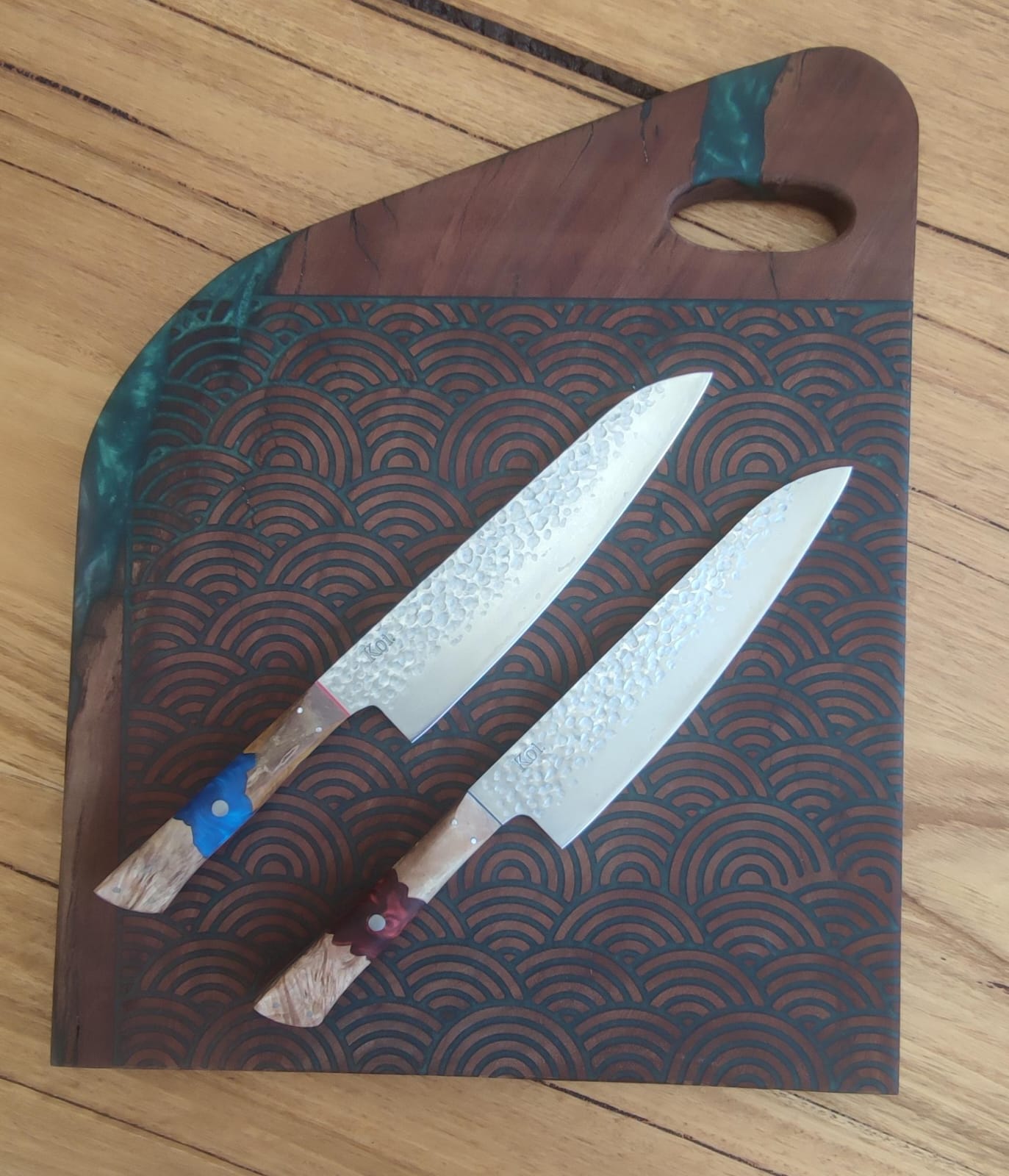Gyuto (Chef’s knife)
Born during the late Meiji era in Japan, forged with the finest Damascus steel, honed and made entirely in South Australia, your local Australian knife makers proudly presents to you the Gyuto Chef’s knife. After the fall of the Samurai came the rise of the Gyuto, a sword for your kitchen, a powerful tool for your hand. The Gyuto is the most commonly acquired all-purpose knife from the Koi Knives collection and is a great place to start when upscaling your kitchen knives.

Use:
The Gyuto is one of the most popular classes of chef’s knives in both Japanese and Western style cooking as it maintains the double bevel design comparable to most Western knives, so your chopping and slicing styles doesn’t have to change. The double bevelling paired with Japanese steel retains the ambidexterity of Western knives while significantly increasing sharpness. The profile of the Gyuto has a slight curve unlike that of straight edged traditional cleavers or “k-tip” knives such as the Bunka Bocho, this allows for the rocking technique when chopping. A highly versatile knife with a blade the length of 210mm it can be used for meat, fish and vegetables, everything you’d need to cut in the kitchen.
History:
The etymology of “Gyuto” originates in the Meiji era of Japan (1868-1912). It literally means Cow Blade in Japanese. The origins of the Gyuto came from the first wave of foreign trade in Japan when commerce between the two cultures created new wealth and correspondingly a new interest in eating more meat. Similar to the development of Wagyu beef, the Gyuto was the Japanese’s answer to celebrating western style cooking and indulgence. However, the Gyuto also has a grittier side to its history as the first of the Gyuto knives in Japan were developed by the very same sword-smiths of samurai swords in Sakai, a port city South of Osaka. During the late Meiji period as part of the initiatives to modernise Japan the samurai were banned from openly carrying swords, this prompted samurai sword manufacturers to diversify their craft into designing and producing high-quality knives instead.
The Australian twist on Japanese tradition:
In the dry Adelaide Hills, as the bright noon reaches its zenith and the sun glints off the rippling bevel of the meticulously crafted blade the first of the Koi Knives was born. It was a unique idea made in the unique timezone (UTC +9:30) of South Australia. Traditional Japanese knives made with Japanese steel but with the highest Australian craftsmanship. A company created by two school friends Shannon and Ramon, they sought to create a quality Australian product. The Gyuto knife was the first knife they designed and made, a true coming together of skill sets, inspiration and will.
The Gyuto knife forms part of the three Japanese Knives Starter Collection along with the Petty and Bunka Bocho knives. Like other Koi Knives the Gyuto is made with high-carbon Damascus Steel (AUS10), its higher carbon content lends its crisp sharpness yet being a form of stainless steel it is more durable than traditional pure carbon-steels.
Koi knives’ signature handles:
Pairing tradition with new innovation is the resin-infused local woods that make up the unique Koi Knives’ handles. Each handle is one of a kind and cannot be replicated. The wood is sourced locally in South Australia’s wine region and varies from the wood from olive trees to Shiraz grapevines.
Specs:
Manufacturer: Koi Knives
Blade steel: Damascus steel (AUS10)
Blade length: 210mm
Handle wood: Varies from wood of olive trees to Shiraz grapevines from McLaren Vale (wine region of South Australia)
Handle length: 140mm
Maintenance:
After each use:
Simply wipe down in warm soapy water, dry and place on a knife rack away from humidity. Job done!
Long term maintenance:
Koi Knives are made with Damascus Steel (AUS10) and therefore has a higher carbon content than the average Western kitchen knives. This lends the knives their particular long lasting sharpness, however they also like to be kept dry when not in use and should not be exposed extensively to heat, hot water or ambient high humidity. They should most definitely never be put into the dishwasher or other such nonsense. Each knife was made with love, so please take care of them for us!
Sharpening:
Knives made with Damascus Steel are harder at the edge, this means less honing is needed but should instead be professionally sharpened and ideally with a whetstone. Depending on frequency of use, the knife may need to be sharpened by a professional every 3-6 months for most people. We have an extensive list of sharpeners we can recommend in every state if you’d like to contact us.
Handle:
Similarly, the handle was crafted with resin and coated with a polish that also should not be soaked in hot water. Extended exposure to hot water may damage the polish on the handle that is the protective shield for the wood and resin. Over the years, if the handle starts to look a bit dull a small amount of furniture polish may be used to buff back the shine.
For more information on knife maintenance please see our page: https://www.koiknives.com/pages/maintenance




